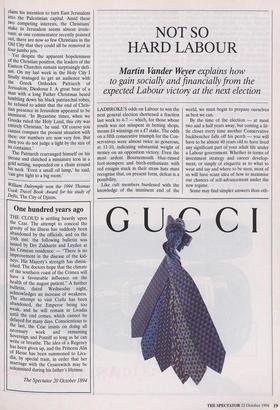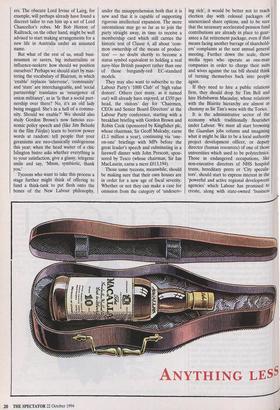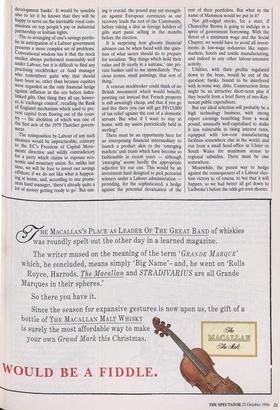NOT SO HARD LABOUR
Martin Vander Weyer explains how to gain socially and financially from the expected Labour victory at the next election
LADBROKE'S odds on Labour to win the next general election shortened a fraction last week to 4-7 — which, for those whose youth was not misspent in betting shops, means £4 winnings on a £7 stake. The odds on a fifth consecutive triumph for the Con- servatives were almost twice as generous, at 11-10, indicating substantial weight of money on an opposition victory. Even the most ardent Bournemouth blue-rinsed foot-stompers and birch-enthusiasts with red ensigns stuck in their straw hats must recognise that, on present form, defeat is a possibility. Like cult members burdened with the knowledge of the imminent end of the world, we must begin to prepare ourselves as best we can.
By the time of the election — at most two and a half years away, but coming a lit- tle closer every time another Conservative backbencher falls off his perch — you will have to be almost 40 years old to have lived any significant part of your adult life under a Labour government. Whether in terms of investment strategy and career develop- ment, or simply of etiquette as to what to wear and say and where to be seen, most of us will have scant idea of how to maximise our chances of self-advancement under the new regime.
Some may find simpler answers than oth- ers. The obscure Lord Irvine of Lairg, for example, will perhaps already have found a discreet tailor to run him up a set of Lord Chancellor's robes. Mr Bob Horton of Railtrack, on the other hand, might be well advised to start making arrangements for a new life in Australia under an assumed name.
But what of the rest of us, small busi- nessmen or savers, big industrialists or influence-seekers: how should we position ourselves? Perhaps we should start by mas- tering the vocabulary of Blairism, in which `enable' replaces 'intervene', 'community' and 'state' are interchangeable, and 'social partnership' translates as 'resurgence of union militancy', as in 'Is that a social part- nership over there? No, it's an old lady being mugged. She's in a hell of a commu- nity. Should we enable?' We should also study Gordon Brown's now famous eco- nomic policy speech and (like Jim Belushi in the film Filofax) learn to borrow power words at random: tell people that your geraniums are neo-classically endogenous this year; when the head waiter of a chic Islington bistro asks whether everything is to your satisfaction, give a glassy, telegenic smile and say, `Mmm, symbiotic, thank you.'
Tycoons who want to take this process a stage further might think of offering to fund a think-tank to put flesh onto the hones of the New Labour philosophy, under the misapprehension both that it is new and that it is capable of supporting rigorous intellectual expansion. The more ostentatious may go so far as to join the party straight away, in time to receive a membership card which still carries the historic text of Clause 4, all about 'com- mon ownership of the means of produc- tion' — no doubt shortly to become a status symbol equivalent to holding a real navy-blue British passport rather than one of those burgundy-red EC-standard models.
They may also want to subscribe to the Labour Party's '1000 Club' of 'high value donors'. Others (not many, as it turned out) will already have enjoyed, at £350 per head, the visitors' day for 'Chairmen, CEOs and Senior Board Directors' at the Labour Party conference, starting with a breakfast briefing with Gordon Brown and Robin Cook (sponsored by Kingfisher plc, whose chairman, Sir Geoff Mulcahy, earns £1.1 million a year), continuing via 'one- on-one' briefings with MPs before the great leader's speech and culminating in a farewell dinner with John Prescott, spon- sored by Tesco (whose chairman, Sir Ian MacLaurin, earns a mere £813,194).
Those same tycoons, meanwhile, should be making sure that their own houses are in order for a new age of fiscal severity. Whether or not they can make a case for omission from the category of 'undeserv- ing rich', it would be better not to reach election day with colossal packages of unexercised share options, and to be sure that the necessary accelerated pension fund contributions are already in place to guar- antee a fat retirement package, even if that means facing another barrage of sharehold- ers' complaints at the next annual general meeting. Further down the scale, those media types who operate as one-man companies in order to charge their suits and wives against the tax bill should think of turning themselves back into people again.
If they need to hire a public relations firm, they should drop Sir Tim Bell and hire Hobsbawm Macaulay, whose relations with the Blairite hierarchy are almost as chummy as Sir Tim's were with the Tories.
It is the administrative sector of the economy which traditionally flourishes under Labour. We must all start browsing the Guardian jobs column and imagining what it might be like to be a local authority project development officer, or deputy director (human resources) of one of those universities which used to be polytechnics. Those in endangered occupations, like non-executive directors of NHS hospital trusts, hereditary peers or 'City specula- tors', should start to express interest in the `powerful and active regional development agencies' which Labour has promised to create, along with state-owned 'business development banks'. It would be sensible also to let it be known that they will be happy to serve on the inevitable royal com- missions on top people's pay or industrial partnership or lesbian rights. The re-arranging of one's savings portfo- lio in anticipation of a Labour government presents a more complex set of problems. Conventional wisdom has it that the stock market always performed reasonably well under Labour, but it is difficult to find any practising stockbroker or fund manager Who remembers quite why that should have been so, other than because equities were regarded as the only financial hedge against inflation in the era before index- linked gilts. One thing they all say, howev- er, is 'exchange control', recalling the Bank of England mechanism which used to pre- vent capital from flowing out of the coun- try — the abolition of which was one of the first acts of the 1979 Thatcher govern- ment.
The reimposition by Labour of any such measure would be impracticable, contrary to the EC's Freedom of Capital Move- ments directive and wildly contradictory for a party which claims to espouse eco- nomic and monetary union. So, unlike last time, we will be free to invest our savings Offshore if we do not like what is happen- ing at home, and, according to one promi- nent fund manager, 'there's already quite a lot of money getting ready to go'. But tim- ing is crucial: the pound may yet strength- en against European currencies as our recovery leads the rest of the Community, before taking a dive as foreign holders of gifts start panic selling in the months before the election.
It is surprising how gloomy financial advisers can be when faced with the ques- tion of what savers should do to prepare for socialism. 'Buy things which hold their value and fit neatly in a suitcase,' one pri- vate banker said to me immediately. 'Pre- cious stones, small paintings, that sort of thing.'
A veteran stockbroker could think of no British investment which would benefit, pointing out instead that French property is still amazingly cheap, and that if you go and live there you can still get FFr13,000 of tax relief against the cost of a domestic servant. But what if I want to stay at home, with my assets patriotically held in sterling?
There must be an opportunity here for an enterprising financial intermediary to launch a product akin to the 'emerging markets' unit trusts which have become so fashionable in recent years — although `emerging' seems hardly the appropriate adjective for our one. This would be an investment fund designed to pick potential winners under a Labour administration — providing, for the sophisticated, a hedge against the potential devaluation of the rest of their portfolios. But what in the name of Mammon would we put in it?
Not gilt-edged stocks, for a start, if Chancellor Brown is going to indulge in a spree of government borrowing. With the threat of a minimum wage and the Social Chapter, we would have to avoid all invest- ments in low-wage industries like super- markets, hotels and textile manufacturing, and indeed in any other labour-intensive activity.
Utilities, with their profits regulated down to the bone, would be out of the question; banks, bound to be interfered with in some way, ditto. Construction firms might be an attractive short-term play if they benefit from a brief flurry of neo-Key- nesian public expenditure.
But our ideal selection will probably be a high technology business, with strong export earnings benefiting from a weak pound, unusually well-capitalised to make it less vulnerable to rising interest rates, equipped with low-cost manufacturing facilities somewhere else in the world, and run from a small head-office in Ulster or South Wales for maximum access to regional subsidies. There must be one somewhere.
Meanwhile, the purest way to hedge against the consequences of a Labour elec- tion victory is, of course, to bet that it will happen, so we had better all get down to Ladbroke's before the odds get even shorter.












































































 Previous page
Previous page